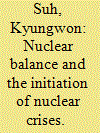| Srl | Item |
| 1 |
ID:
193103


|
|
|
|
|
| Summary/Abstract |
This paper revisits the latest statistical evidence for the nuclear emboldenment thesis—nuclear-armed states are more likely to initiate military aggression than non-nuclear states—from (Bell and Miller 2015). If correct, their findings have important theoretical and policy implications regarding the effect of nuclear proliferation on international conflict. This paper shows, however, that Bell and Miller’s findings heavily rely on two important components of their statistical analysis: (1) using all state dyad observations, and (2) employing pooled regression models to analyze time-series-cross-sectional (TSCS) data. I argue that those components are based on questionable assumptions on heterogeneity in their dataset. Based on alternative strategies dealing with heterogeneity in dyadic data, my reanalysis shows that the emboldening effect of nuclear weapons is not as robust as originally claimed. Instead, I find the robust deterrent effect of nuclear weapons: nuclear-armed states are less likely to be targeted in military disputes. These findings highlight the need for careful application of quantitative methods to produce a more robust understanding of nuclear issues.
|
|
|
|
|
|
|
|
|
|
|
|
|
|
|
|
| 2 |
ID:
190844


|
|
|
|
|
| Summary/Abstract |
The nuclear competition school, an emerging theoretical perspective on the political effect of nuclear weapons, argues that a favorable nuclear balance can significantly reduce one’s expected costs of nuclear war and therefore affect the interaction between nuclear-armed states, such as deterrence and crisis outcomes. This new perspective also presents a wide array of empirical evidence demonstrating the significant effect of the nuclear balance of power on political outcomes, thereby challenging the theory of the nuclear revolution, which argues that the nuclear balance of power produces no meaningful effects on political outcomes because no state can escape costly nuclear destruction. Little attention, however, has been paid to systematically exploring the effect of the nuclear balance on the initiation of nuclear crises. This is surprising, given that observable factors, such as the nuclear balance, should have a powerful effect at the crisis initiation stage because countries can observe military balance and assess the costs and benefits of entering a crisis. This article tests a core argument of the nuclear competition school regarding the effect of the nuclear balance on the initiation of nuclear crises. With original data on strategic nuclear balance, my statistical analysis shows that having a superior nuclear arsenal than another nuclear-armed opponent does not lead to a reduced likelihood of nuclear crisis initiated by the opponent. These core findings hold after conducting a series of robustness tests with various measures of the balance of nuclear forces. They encourage us to reconsider the persuasiveness of the nuclear competition school and offer implications for US nuclear policy and force size.
|
|
|
|
|
|
|
|
|
|
|
|
|
|
|
|